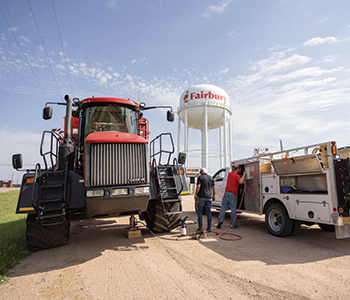The Many Jobs of Radial Ag Tires
May 30, 2025

Written by Brent Colgrove, Tire Department Manager
Radial ag or tractor tires have many jobs:
1. Protecting the Soil—Ag tires play a vital role in soil health. By reducing ground pressure, they help minimize compaction. Less compaction means better root growth, leading to higher crop yields!
2. Providing Traction— A tire’s job isn’t just to roll—it needs to grip the ground and transfer power from the tractor’s engine efficiently. Most ag tires fall into the R-1 or R-1W tread depth categories.
3. Ensuring Operator Comfort—Long hours in the cab make ride quality important. A good ag tire helps absorb shocks and vibrations, keeping operators comfortable throughout the day.
4. Handling Higher Speeds—Modern tractors are moving faster, and tires must keep up. Many agricultural tires today have a speed rating of up to 40 mph.
5. Supporting Heavy Loads—With farm equipment getting larger and heavier, tires must be built to handle high weight capacities without sacrificing performance.
6. Managing Road Travel—Farms are growing, which means more time spent transporting equipment between fields. "Roading"—taking equipment onto public roads—places extra demands on tires, making durability and road handling crucial factors in performance.
Radial ag or tractor tires have many jobs:
1. Protecting the Soil—Ag tires play a vital role in soil health. By reducing ground pressure, they help minimize compaction. Less compaction means better root growth, leading to higher crop yields!
2. Providing Traction— A tire’s job isn’t just to roll—it needs to grip the ground and transfer power from the tractor’s engine efficiently. Most ag tires fall into the R-1 or R-1W tread depth categories.
3. Ensuring Operator Comfort—Long hours in the cab make ride quality important. A good ag tire helps absorb shocks and vibrations, keeping operators comfortable throughout the day.
4. Handling Higher Speeds—Modern tractors are moving faster, and tires must keep up. Many agricultural tires today have a speed rating of up to 40 mph.
5. Supporting Heavy Loads—With farm equipment getting larger and heavier, tires must be built to handle high weight capacities without sacrificing performance.
6. Managing Road Travel—Farms are growing, which means more time spent transporting equipment between fields. "Roading"—taking equipment onto public roads—places extra demands on tires, making durability and road handling crucial factors in performance.